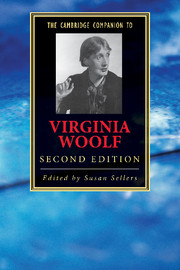Book contents
- Frontmatter
- 1 Bloomsbury
- 2 Virginia Woolf’s early novels: Finding a voice
- 3 From Mrs Dalloway to The Waves: New elegy and lyric experimentalism
- 4 The novels of the 1930s and the impact of history
- 5 Virginia Woolf’s essays
- 6 Virginia Woolf, modernism and modernity
- 7 The socio-political vision of the novels
- 8 Woolf’s feminism and feminism’s Woolf
- 9 Virginia Woolf and sexuality
- 10 Virginia Woolf, Empire and race
- 11 Virginia Woolf and visual culture
- 12 Virginia Woolf and the public sphere
- Guide to further reading
- Index
3 - From Mrs Dalloway to The Waves: New elegy and lyric experimentalism
Published online by Cambridge University Press: 28 July 2010
- Frontmatter
- 1 Bloomsbury
- 2 Virginia Woolf’s early novels: Finding a voice
- 3 From Mrs Dalloway to The Waves: New elegy and lyric experimentalism
- 4 The novels of the 1930s and the impact of history
- 5 Virginia Woolf’s essays
- 6 Virginia Woolf, modernism and modernity
- 7 The socio-political vision of the novels
- 8 Woolf’s feminism and feminism’s Woolf
- 9 Virginia Woolf and sexuality
- 10 Virginia Woolf, Empire and race
- 11 Virginia Woolf and visual culture
- 12 Virginia Woolf and the public sphere
- Guide to further reading
- Index
Summary
What was I going to say? Something about the violent moods of my soul. How describe them, even with a waking mind? I think I grow more & more poetic. Perhaps I restrained it, & now, like a plant in a pot, it begins to crack the earthenware. Often I feel the different aspects of life bursting my mind asunder.
(Virginia Woolf, diary entry for 21 June 1924)Exclaiming over 'the beauty of the writing', Lytton Strachey, in his praise for Jacob's Room, prophesied to Woolf 'immortality for it as poetry' (14 October 1922; D2, p. 207). Not long after, Woolf, during the composition of Mrs Dalloway, identified a growing poetic tendency in her writing. This chapter will trace her development of this 'more & more poetic' tendency in the four novels at the heart of her uvre, Mrs Dalloway (1925), To the Lighthouse (1927), Orlando: A Biography (1928) and The Waves (1931), the latter representing for many the culmination of her experimental lyric technique, a tour de force in high modernist poetic fiction. During this rich creative period, Woolf's diary frequently reflects on the poetic tendencies in her writing as well as in modern fiction more generally, and she published numerous essays touching on these matters. The novels emerge in dialogue with these private and public reflections. This chapter will draw, in particular, on Woolf's diary and her arguments in 'Poetry, Fiction and the Future' (1927) and A Room of One's Own (1929).
But what does it mean for novel-writing to become 'more & more poetic'? Here, Woolf herself connects this process with 'the violent moods of [her] soul', suggesting the poetic dimensions of her prose to be loosely understood as the expression of an intensely subjective emotion or spirituality. Figuring her growing poetic impetus as ‘crack[ing]’ and ‘bursting’, she seems to be invoking, in the year in which T. S. Eliot’s The Waste Land was first published, William Wordsworth’s encapsulation of poetry, in his Preface to the Lyrical Ballads, as ‘the spontaneous overflow of powerful feeling’, the very formulation of Romantic poetics against which Eliot, the leading modernist poet and Woolf’s friend, fulminates in his manifesto ‘Tradition and the Individual Talent’ (1919).
- Type
- Chapter
- Information
- The Cambridge Companion to Virginia Woolf , pp. 49 - 69Publisher: Cambridge University PressPrint publication year: 2010
- 2
- Cited by



